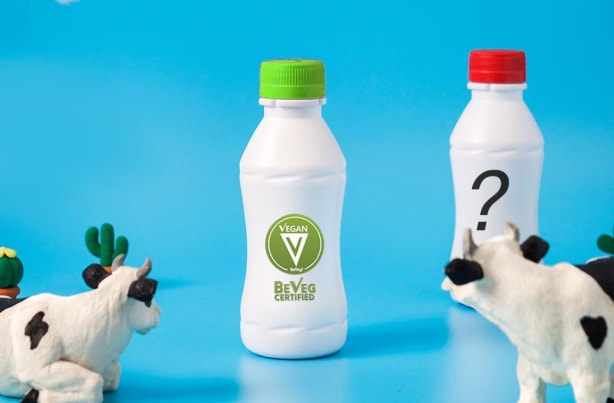“Dairy-free”, “non-dairy”, “plant-based”, “kosher”, and “Vegan” labeling are all voluntary label claims, and while the FDA has no meaningful regulation for these meaningful marketing claims, OU kosher and BeVeg Vegan certification standards exist to clear consumer confusion.
It would seem that dairy-free and non-dairy, Vegan, and kosher pareve mean a product has no dairy, right? Wrong. While these labels are similarly used, they are often misleading as they remain largely unregulated by the Food and Drug Administration (FDA) and European Union (EU).
Vegan Certified Label Claims
“Vegan” certified is a voluntary claim that lacks government regulation. However, the consumer believes “Vegan” to mean free-from animal material (including animal allergens), 100% plant-based and cruelty-free. However, if you see a Vegan Trademark, like BeVeg, it clears all confusion because it verifies the product is in fact “dairy-free”, “non-dairy”, “plant-based”, and “cruelty-free. BeVeg is the world’s only accredited Vegan certification standard to conduct on-site audits globally to ensure there is no cross-contamination with animal materials. A Vegan certified claim should be made according to strict standards.
A BeVeg Vegan certified product means:
Not of animal origin. No animal cross-contamination. No animal exploitation and without animal suffering. A Vegan product to the expectant consumer means free-from animal material and cruelty-free. Veganism goes far beyond plant-based food and dietary choices; it spans all industry sectors. A Vegan certified product should mean it is not of animal origin, and that at no stage of the production and processing was there use of or supplementation with any animal ingredients, substrates, processing aides or other substances of animal origin in processed or unprocessed form (including additives, carriers, flavorings, and enzymes). There should be no cross-contamination with animal contaminants at the facility level, even if it was made at a shared facility due to BeVeg required standard operating procedures (SOPs) that ensure separation, segregation and a senior level commitment to Vegan product label claims. There shall be no testing that would cause animal suffering, on the final product, or in the supply chain.
Kosher Pareve Label Claim
An OU kosher certified product with the “OU” symbol means:
The product is Kosher (but not necessarily Kosher for Passover); the product contains neither dairy nor meat, nor any dairy or meat derivatives; the product was not made on dairy equipment; the product was not made on equipment used for making meat products. In Kosher Lexicon, such a product is called ‘Pareve’ or ‘Parve.’ Equipment, pots, dishes, cutlery, etc that has not been used for dairy and not for meat is also called ‘Pareve Equipment’, ‘Pareve Pots’ etc. Pareve foods may be eaten with milk or with meat.Pareve foods may be re-cooked in any Kosher equipment be it meat or be it dairy.
Dairy-Free Label Claim
 There is no standard or regulation for “dairy-free” claims and these claims should be read cautiously by the consumer. Dairy-free should mean free from dairy and dairy derivatives like milk, cheese, yogurt, sour cream, casein, lactose and other dairy allergens. However, since this is unregulated, many “dairy-free” claimed products have been found to have dairy. The FDA released the results of a new survey of dark chocolate products labeled as “dairy free” and found that 12 of 119 samples had potentially hazardous levels of milk allergen. The levels, ranging from 600 to 3,100 parts per million (ppm), had the potential to cause severe reactions in consumers with milk allergy. All four products were recalled. The problem with dairy-free claims alone is that they are unregulated without universal standards.
There is no standard or regulation for “dairy-free” claims and these claims should be read cautiously by the consumer. Dairy-free should mean free from dairy and dairy derivatives like milk, cheese, yogurt, sour cream, casein, lactose and other dairy allergens. However, since this is unregulated, many “dairy-free” claimed products have been found to have dairy. The FDA released the results of a new survey of dark chocolate products labeled as “dairy free” and found that 12 of 119 samples had potentially hazardous levels of milk allergen. The levels, ranging from 600 to 3,100 parts per million (ppm), had the potential to cause severe reactions in consumers with milk allergy. All four products were recalled. The problem with dairy-free claims alone is that they are unregulated without universal standards.
What Non-Dairy Means
While the non-dairy claim is regulated by the FDA, the claim itself is misleading to consumers as “non-dairy” allows for the presence of milk protein, and may in fact contain some form of dairy, whey, casein, or lactose, and is often used in “plant-based” products – but should not be claimed in Vegan products. Since existing laws allow manufacturers and brand owners to self-claim, consumers are often misled by the loose use of these similar but very different label disclaimers. Non-dairy is more aligned with a “plant-based” label claim but cannot be used interchangeably with a Vegan label claim. Plant-based claims do not mean 100% plant-based and Vegan but rather mean mostly based in plants.
Bottom Line: not all labels are created equal
Consumer protection laws are supposed to protect the consumer from misleading label claims, but that is not the case while these labels remain largely unregulated. Plant-based and non-dairy does not mean dairy-free. Even dairy-free does not mean dairy-free. However, Vegan certified by BeVeg and OU kosher certified with the OU symbol means the product was audited to mean dairy-free. This is important for the Vegan consumer, flexitarian and allergen sufferer because while the amounts of dairy detected may be small in the final product, that can still be significant to the consumer, especially sensitive allergic consumers.
Vegan and OU kosher are complementary product claims, and the BeVeg and OU kosher audit can happen simultaneously. To apply for the Vegan-Kosher bundled certification audit, and get a custom quote, click here to apply for Vegan-kosher certification quote. You can also contact Phyllis Koegel koegel@ou.org

